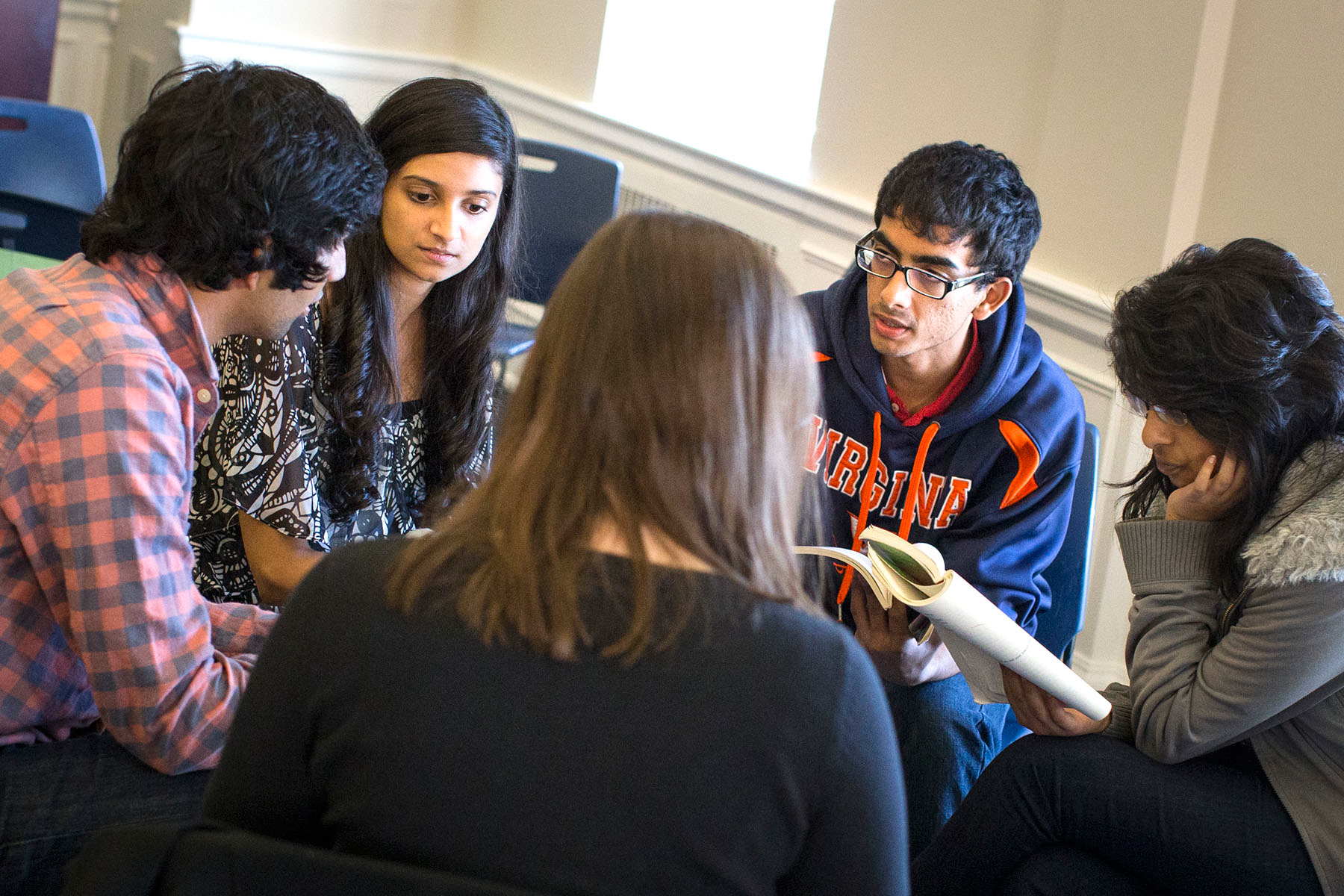Growing up in Dhaka, Bangladesh, Nishat Jabin’s first language was Bengali. But one of her great pleasures was watching English-language cartoons. She ranks “Tom and Jerry,” “Hey Arnold!” and “Scooby-Doo” among her childhood favorites.
“I always said I wanted to know more languages than I have fingers,” said Jabin, a third-year mathematics major at the University of Virginia.
Jabin is on her way to conquering one hand, at least. Beside her fluency in Bengali and English, she also is proficient in Hindi and Urdu.
Jabin is one of many U.Va. students whose immersion into foreign tongues extends beyond the language classroom. Quite a few of these students came to Grounds from other countries or spent significant time abroad before arriving at U.Va. Others, however, say their time at the University supplied them with opportunities to master new languages.
Chris Haberland, a first-year master’s student in the Frank Batten School of Leadership & Public Policy, speaks English, Spanish, Farsi and Arabic. He’s also dabbled in Basque, a language isolated to northern Spain, and classical Nahuatl, the language spoken by the Aztec elite when the Spanish colonized Central America.
Haberland, who was born in Charleston, S.C., and grew up in Herndon, graduated from U.Va. in 2013 with a major in Spanish Literature & Culture. He spent his second year as an undergraduate studying in Valencia, Spain. Last year, he used a Critical Language Scholarship to study Arabic in Rabat, Morocco.
Although he says his overseas experience was essential, he attributes his polyglotism in large part to his time in the classroom. “To actually carry out my language-learning goals, I took language classes wherever I could fit them into my schedule,” he said.
Haberland said that U.Va. provides a dynamic environment for students to explore different languages. “U.Va. has extremely strong foreign language departments and numerous student clubs dedicated to celebrating different languages and cultures,” he said. “Many students become multilingual after devoting their summers to language study, either at U.Va.’s intensive Summer Language Institute or by winning grants to attend other language schools.”
Haberland isn’t finished learning new languages. This semester, he jumped into a Portuguese class.
For Denise Taylor, a third-year government major, knowing several languages has broadened the intellectual opportunities available to her. A native speaker of English and Turkish, fluent in French and German, and conversationally proficient in Farsi, Taylor has taken several French and German literature courses at U.Va.
Taylor was born in Germany, and her family moved to the U.S. when she was a year old. Her mother’s side of the family is Turkish, and she spends almost every summer in Turkey.
“When I was a little kid and did something I wasn’t supposed to (which was all the time), my parents sent me to the corner and I would have to count to 50 in Turkish, English, German and French,” she said. “I think my parents had a hidden agenda.”
Language instruction at U.Va., such as her classes in Farsi, has helped Taylor further explore new ways of thinking and speaking.
“The more languages you know, the more fun it is to learn new ones,” she said. “My favorite part of studying a new language is seeing how a specific culture is mapped out onto it. Learning a word that describes a concept that you can relate to, but couldn’t articulate before, is the best feeling.”
Jabin said that knowing foreign languages not only led her in new intellectual directions; it has also opened up new social possibilities. A close friendship in Bangladesh spurred her to learn Hindi; her best friend (since the age of 3, she says) came from an Indian-Pakistani background. Consequently, Jabin’s friend was born into a multilingual household – her mother’s side spoke Hindi; her father’s side spoke Urdu.
“I would spend so much time at her place that I caught up to the language very easily,” Jabin said. “As of this day, when I speak to her, I speak to her in Hindi, even though we were both in Dhaka where the language was Bengali.”
Similarly, Spanish became a point of union for Haberland and his father. “Starting when I was around 4 years old, my dad used to play Spanish cassette tapes while he drove me around in his pickup truck,” he said. “Spanish was his first language and he encouraged me to study it formally in middle school when it was first offered as a class.”
Jabin said she thought it was more common for U.Va. students to speak Romance languages, such as French and Spanish, than languages spoken outside of Europe. But she said it’s easy to find conversation partners in nearly any foreign tongue on Grounds.
“One of the best things about U.Va. is that you always find someone who can chat in a foreign language,” she said. “Yesterday I was having a conversation with a friend in Urdu.”
Taylor, Haberland and Jabin agreed that the presence of multilingual students, whether international or not, enriches the University’s social and cultural texture. “I would say it’s fairly common for students to speak multiple languages here,” Haberland said.
Language ability is often touted as increasingly vital for businesses in a time of global commerce, as a diplomatic and national security necessity, and as a prerequisite for research in a host of areas. Haberland said, however, that he came to languages not for pragmatic reasons but out of “enchantment.”
“The languages I have studied have all become conduits for learning in other spheres,” he said. “Every time I immerse myself in a new language, I absorb a new culture, another history, a rich artistic tradition. I know I am more creative having appreciated the prose of Borges, the masterpieces of Iranian cinema and the sound of gnawa. These things give me great joy, and I would never have known them if I had not embarked upon the study of languages.”
Media Contact
Article Information
April 16, 2014
/content/uva-students-pursue-pleasures-multilingualism

